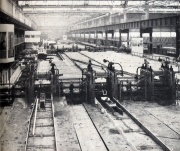Tinsley Park Steelworks: Difference between revisions
No edit summary |
No edit summary |
||
| (One intermediate revision by the same user not shown) | |||
| Line 16: | Line 16: | ||
1967 Became part of [[British Steel]] on nationalisation | 1967 Became part of [[British Steel]] on nationalisation | ||
1968 A majority interest in the bar rolling mills was sold back to the private sector; a new JV company was formed for this venture called [[Sheffield Rolling Mills]]. Steel production and the bloom and billet mills would remain in state hands.<ref>The Times Sept. 19, 1968</ref> | |||
1973 British Steel planned to build its new stainless steel manufacturing plant on the Tinsley Park site<ref>The Times May 25, 1973</ref> | 1973 British Steel planned to build its new stainless steel manufacturing plant on the Tinsley Park site<ref>The Times May 25, 1973</ref> | ||
1973 British Steel planned to concentrate manufacture of a new type of spring at Tinsley Park, closing the old spring production facility at Stocksbridge<ref>The Times Aug. 17, 1973</ref> | 1973 British Steel planned to concentrate manufacture of a new type of spring at Tinsley Park, closing the old spring production facility at Stocksbridge<ref>The Times Aug. 17, 1973</ref> | ||
1974 Stocksbridge was reprieved and would continue to make leaf springs<ref>The Times May 25, 1974</ref> | |||
1974 The under-utilised bar mills were to be sold off to a private joint venture company, [[Sheffield Rolling Mills]], owned 45 percent by British Steel, 38 percent by [[Balfour and Darwins|Darwins]] and 17 percent by [[James Neill and Co (Sheffield)|James Neill Holdings]]; ownership of the bloom and billet mills stayed with the rest of the steel works as part of British Steel<ref>The Times Sept. 19, 1968</ref> | 1974 The under-utilised bar mills were to be sold off to a private joint venture company, [[Sheffield Rolling Mills]], owned 45 percent by British Steel, 38 percent by [[Balfour and Darwins|Darwins]] and 17 percent by [[James Neill and Co (Sheffield)|James Neill Holdings]]; ownership of the bloom and billet mills stayed with the rest of the steel works as part of British Steel<ref>The Times Sept. 19, 1968</ref> | ||
Latest revision as of 08:40, 18 February 2025











Tinsley Park Steelworks
1963 Formally opened by the Duke of Edinburgh on behalf of English Steel Corporation[1]
1967 Became part of British Steel on nationalisation
1968 A majority interest in the bar rolling mills was sold back to the private sector; a new JV company was formed for this venture called Sheffield Rolling Mills. Steel production and the bloom and billet mills would remain in state hands.[2]
1973 British Steel planned to build its new stainless steel manufacturing plant on the Tinsley Park site[3]
1973 British Steel planned to concentrate manufacture of a new type of spring at Tinsley Park, closing the old spring production facility at Stocksbridge[4]
1974 Stocksbridge was reprieved and would continue to make leaf springs[5]
1974 The under-utilised bar mills were to be sold off to a private joint venture company, Sheffield Rolling Mills, owned 45 percent by British Steel, 38 percent by Darwins and 17 percent by James Neill Holdings; ownership of the bloom and billet mills stayed with the rest of the steel works as part of British Steel[6]
1985 British Steel's Tinsley Park special steels complex included the Tinsley Park works, the Stocksbridge Works and Aldwarke Works[7]

